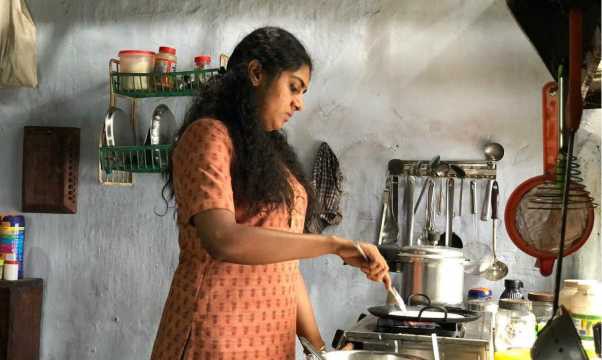
The Many roles of the Great Indian Kitchen
Sometime in 6th century BC, Sumangalamata, the wife of an umbrella maker, mother of Sumangala, left her family to become a Theri,,a Buddhist nun. This is a poem she wrote as she experienced the sweet taste of liberation.
A woman well set free! How free I am,
How wonderfully free, from kitchen drudgery.
Free from the harsh grip of hunger,
And from empty cooking pots,
Free too of that unscrupulous man,
The weaver of sunshades.
Translated by: Uma Chakravarti and Kumkum Roy
From: “Women Writing In India-Edited by Susie Tharu and K. Lalita
Thousands of years later, the Indian kitchen continues to exert a stranglehold on women across the country. Last week, I watched the Malayalam movie — ‘The Great Indian Kitchen’, (TGIK) directed by Jeo Baby. The kitchen is the most important character in the film taking on many roles- it starts off as an innocuous place for the production of food, a training site for a new daughter-in-law and soon becomes a labor camp, a prison cell, and a graveyard for murdered dreams. The production of food is an arduous chore here- it bears no resemblance to the joyous creative activity romanticized in all the cooking shows. The peeling, chopping, grinding, frying, stirring, followed by the endless washing, clearing and cleaning are thankless tasks imbued with a sinister menace. Failure to produce in this factory earns the displeasure of the menfolk who seem blissfully oblivious to all the hard work that goes into making a single meal. The father-in-law in the film insists on the rice being slow cooked over a traditional firewood stove and his son follows his example, leaving the messy detritus of their meals to be cleared away by the women.
Patriarchy is not just about blatant abuse, harassment or ill-treatment of women. It’s more insidious form is covert misogyny and the perpetuation of old gendered norms. It is seen in the insistence of freshly cooked food items for every meal, the stubborn refusal to use ‘modern’ time-saving devices in the kitchen and the normalization of the hot roti or dosa’s journey from the stove to the table. Women also fervently promote these notions in the name of tradition by fawning over men and extracting work from other women.
I grew up in a home where my sister and I did very little housework. My father made tea and sandwiches for our lunchboxes. We had employed cooks at different points of time since my mother also worked as a teacher. No one insisted on my mastery of the fine culinary arts as a necessary condition for a happy married life. After marriage, I have always had the luxury of a cook and have given complete responsibility of the kitchen to her. I am married to a foodie but not a fastidious one, who has over the years been trained to have low expectations from me on the culinary front. My in-laws, during their visits, are accommodating and happy enough to eat meals produced by the cook. Yet, I do enter the kitchen and supervise the traditional Tamil cooking when they are there. There have been moments when I have felt guilty for not churning out nutritious wholesome meals for the family. I have not admitted to my inability to make rotis and bake cakes. There is still a vestige of the notion of cooking as an important accomplishment for women.
I have seen many instances where the production and consumption of food was seen through gendered lenses. During festivals and functions, the women would toil away in the kitchen preparing a variety of delicacies , then serve the men and only eat afterwards. No one served the women hot food on their plates. This was normal. An old aunt spoke derisively of a relative who chopped vegetables for his wife- clearly an inept woman. Any man who displayed some interest in entering the kitchen was shooed away. Used plates were taken from his hands and carried to the sink. Girls were asked to serve coffee to guests and help out in the cooking. Boys were left to their own devices. Women are judged on their ability to churn out seven course meals and men on their ability to earn seven figure salaries.
It is interesting that most professional chefs are men and almost all domestic cooks are women who don’t get paid for their labor. The ideal wife and mother is supposed to cook with love and feed her family with devotion and care. She is supposed to be thankful for this opportunity to serve and fulfil her duty. Yes, there are many women (and men) who enjoy cooking, who see it as a creative expression as well as a way to nourish their family. But when there is no choice in the matter, when there is no support for the hard work, when there are endless unreasonable expectations, the Great Indian Kitchen can become a terrible hellhole. The aroma of freshly ground spices is replaced by the stench of rotting waste. Resentment simmers, rage boils over and the pressure cooker of repressed emotions explodes.
Unlike her mother-in-law who has toiled away uncomplaining in the kitchen for years, the heroine of the TGIK is unwilling to sacrifice her freedom and happiness at the stove of patriarchal norms. Watch the movie to see if she escapes from kitchen drudgery and the unscrupulous man, like the Buddhist nun.
Many women are not as fortunate. The current Pandemic situation has not made it easier for women who need to run the kitchen, look after the kids and do their own work. There is no escape from the domestic chores. In fact, the percentage of women in the workforce has dropped in 2020 to an all time low of 20.3 % as per the recent Economic survey and unpaid work has increased.
If we want to create a more just and equitable world outside, we need to start from inside the home-from the confines of the Indian kitchen. We need some simple mindset shifts by men and women.
It is okay to eat leftovers.
Rotis and dosas from a casserole are edible and tasty.
Every meal does not need to be a major production.
Boys can cook and do dishes without making a dent in their masculinity.
Allowing men into the kitchen is not a breach of tradition.
Serving simple healthy one pot meals does not make you a bad woman.
The kitchen becomes great not because of the quantity or quality of meals churned out but by allowing both genders equal access and equitable ownership for the food that is produced there.
